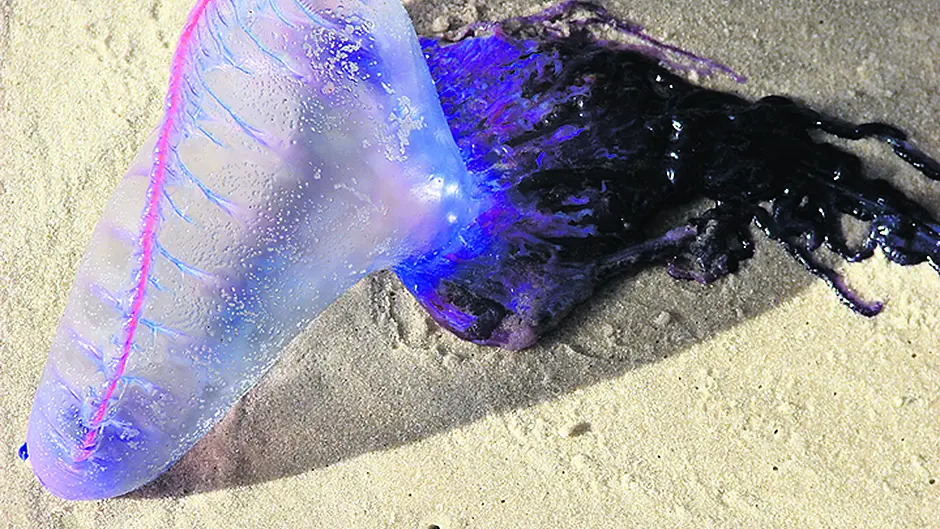The potentially-lethal Portuguese Man O' War jellyfish have been spotted at two locations in West Cork for the first time ever in the month of February.
THE potentially-lethal Portuguese Man O’ War jellyfish have been spotted at two locations in West Cork for the first time ever in the month of February.
The sightings in recent days – at Union Hall and Seven Heads – in the sea and on the shore, have led to the Irish Whale and Dolphin Group (IWDG) describing the unusual occurrence as a sign of ‘climate chaos’.
The creatures, with their distinctive mauve tinted tails and bright blue tentacles, can kill, paralyse or at the very least inflict an incredibly painful sting. If spotted, the advice is to keep well clear.
Padraig Whooley of the IWDG believes their arrival so early in the year is directly linked to climate change. Mr Whooley said the deadly Man O’ War would never have been seen in this region until at least September or October.
And they are also a cause of concern to West Cork’s growing community of year-round sea swimmers.
He said: ‘It’s extremely bizarre to see them at this time of year and this is more evidence that the ocean has gone completely bonkers.’
In recent years the colourful jellyfish have come into The Warren, Long Strand and Allihies as late as October, prompting major safety warnings. Even detached particles of their tentacles floating in the water or lying on the sand can be poisonous.
Dog walkers are also reminded to be vigilant on beaches as a result of the recent sightings.
‘All indicators point to not even climate change, but climate chaos, as being the reason for the Man O’ War,’ said Mr Whooley.
The unseasonal weather is also being blamed for a spike in the number of dead dolphins being washed up on local beaches, including most recently in Schull on Tuesday.
The dolphin is one of seven dolphins and a sperm whale which have reportedly washed up in the last week along the Cork coast.
In February alone, dead dolphins were found stranded at Ballinglanna Bay at the Seven Heads; at Duneen Strand, Ardfield; twice at Union Hall; in Bantry Bay and Tralong Bay. A sperm whale was also found washed up at Long Strand.
Although the dolphin found in Schull this week had fishing rope attached to his beak, Mr Whooley believes most of the dolphin deaths are a result of full moons and big seas combining.
A number of seal pups were also found washed up on various shores around West Cork in early January, believed to have been struggling with the rough seas.
The IWDG is collaborating with the regional veterinary labs on the Model Farm Road in a scheme which will see post-mortems carried out on any cetacean species recovered.









